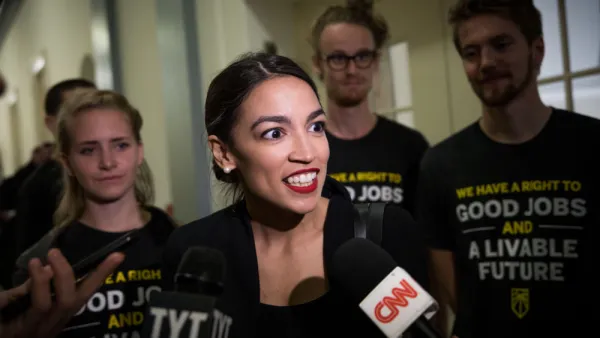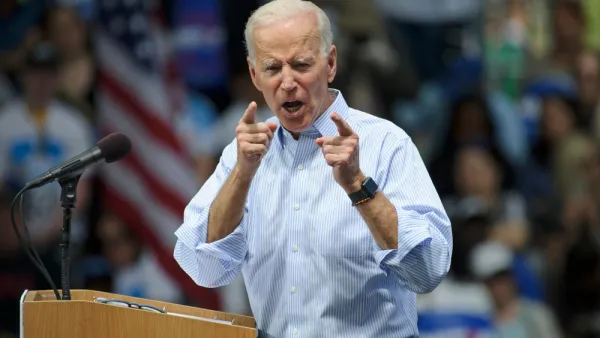Economics 101: It's difficult to reduce an activity if there's no price attached to it, so why are many environmentalists increasingly turning away from wanting to price carbon emissions?

"This month's fuel-tax riots in Paris and the defeat of a carbon-fee ballot measure in Washington state show the difficulty of getting people to support a levy on the energy sources that heat their homes and power their cars," report Zack Colman and Eric Wolff for POLITICO.
The story of the carbon tax’s fading appeal, even among groups that like it in principle, shows the difficulties of crafting a politically palatable solution to one of the world’s most urgent problems — including greenhouse gas levels that are on track to reach a record high this year.
"If it can't pass in Washington state right now, I'm not sure that says that there's much of a pathway at this moment nationally," said Sen. Jeff Merkley (D-Ore.).
California is the only state government that prices carbon emissions, using a cap-and-trade program created by the Global Warming Solutions Act of 2006, which was renewed two years ago, setting a goal to reduce emissions 40 percent below 1990 levels by 2030. Last year the state passed separate legislation to continue the cap-and-trade program through 2030.
Meanwhile, even the most liberal Democratic candidates this year gave carbon taxes scant if any mention in their climate platforms, focusing instead on proposals like a phaseout of fossil fuels and massive investments in wind and solar power.
For example, Rep.-elect Alexandria Ocasio-Cortez (D-N.Y), who supports a carbon tax, is "promoting it as just one possible element of a sweeping 'Green New Deal' that includes pouring huge amounts of money into renewable energy," note Colman and Wolff.
Could the explanation be as simple as an aversion to new taxes, particularly after the Republicans' landmark tax-cutting package?
"You do have this irony, and that is the policy that is overwhelmingly endorsed by economists of the right, the center and the left as the best way to reduce greenhouse gas emissions is inverse with what is politically feasible," said Barry Rabe, director of the Center for Local, State, and Urban Policy at the Gerald Ford School of Public Policy at the University of Michigan, who has studied carbon taxes.
Adding to the irony is that the public believes climate change is real, notwithstanding President Trump's rejection of climate science that is echoed by much of the GOP. Rabe points to a University of Michigan survey last month that found that 73 percent of Americans believe there is solid evidence of global warming.
Colman and Wolff delve into many aspects of carbon taxes—countries that have adopted and rejected them, and different types. A bipartisan congressional bill that has received much recent attention, H.R.7173 - Energy Innovation and Carbon Dividend Act of 2018, sponsored by Reps. Ted Deutch (D-Fla.) and Brian Fitzpatrick (R-Pa.), was unveiled on Nov. 27.
According to Deutch, the bill will price "carbon at $15 per metric ton of CO2e and increasing the price by $10 every year. The Treasury Department would return 100% of the net revenue back to the American people, a policy highlighted by a Treasury Department report as helping lower- and middle-income families." See one-page fact sheet [pdf].
Hat tip to Mark Boshnack.
FULL STORY: Why greens are turning away from a carbon tax

Analysis: Cybertruck Fatality Rate Far Exceeds That of Ford Pinto
The Tesla Cybertruck was recalled seven times last year.

National Parks Layoffs Will Cause Communities to Lose Billions
Thousands of essential park workers were laid off this week, just before the busy spring break season.

Retro-silient?: America’s First “Eco-burb,” The Woodlands Turns 50
A master-planned community north of Houston offers lessons on green infrastructure and resilient design, but falls short of its founder’s lofty affordability and walkability goals.

Test News Post 1
This is a summary

Analysis: Cybertruck Fatality Rate Far Exceeds That of Ford Pinto
The Tesla Cybertruck was recalled seven times last year.

Test News Headline 46
Test for the image on the front page.
Urban Design for Planners 1: Software Tools
This six-course series explores essential urban design concepts using open source software and equips planners with the tools they need to participate fully in the urban design process.
Planning for Universal Design
Learn the tools for implementing Universal Design in planning regulations.
EMC Planning Group, Inc.
Planetizen
Planetizen
Mpact (formerly Rail~Volution)
Great Falls Development Authority, Inc.
HUDs Office of Policy Development and Research
NYU Wagner Graduate School of Public Service




























